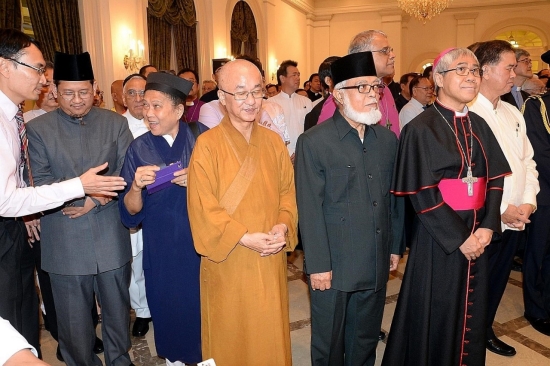03 Aug 2015

Mohammad Alami Musa
Published Aug 3, 2015, 5:00 am SGT
Religious leaders play crucial role, along with the State, in maintaining social peace
There may be very few countries, perhaps none, that have enjoyed religious harmony for as long as Singapore. Fifty years have passed since independence and Singapore is still an oasis of harmony.
Critics of Singapore's political system are quick to attribute this outstanding success to their perception that Singapore is a quasi-authoritarian state characterised by a strict legislative framework, socially intrusive policies and uncompromising enforcement action. Singapore offers no apology for adopting a tough approach as the maintenance of religious harmony is too critical to be left to chance.
However, one factor which the critics always miss is the strong, selfless commitment of religious leaders in Singapore to protect religious harmony. Their influence on creating a positive interreligious milieu is far greater than the available powerful instruments of the State.
Indeed, their significant contributions to social peace began to be felt even before the creation of the new Singaporean state. For example, leaders of the Inter Religious Organisation (IRO) mobilised faith leaders to put forth the peaceful nature of religion and played a significant role in the reconciliation process within the population in the aftermath of the 1950 Maria Hertogh riots and the 1964 community riots.
Religious leaders continue to play a crucial role in building religious harmony today. The harmony is largely dependent on goodwill as well as tolerance and has been able to hold Singapore's religiously plural society together.
This is even though it is built on not very deep knowledge of each other's religious traditions and an attitude that falls short of inclusivity of the religious "Other".
These shortcomings are a source of concern as Singapore enters the next 50 years of its existence in an uncertain world of rising religious fundamentalism, unprecedented religious diversity and heightened intolerance. These external threats may severely test interreligious relations in Singapore.
The harmony that exists among religious communities in future needs to be resilient and sustainable. It has to be well-founded on inter-religious literacy, a strong attitude of inclusivity of the religious Other and a feeling of mutual dependence on each other.
A global scholar on religion, Dr Paul Knitter, suggested that to achieve this, religious communities should embrace a "non-zero sum" mindset in religious life when encountering other communities.
Such a mindset discourages a religious community from feeling superior over other communities and from competing with, dominating or even replacing them. Rather, it promotes the virtue of humility and collaboration, so that all religious communities will prosper in their interreligious encounters.
This means that the non-zero sum mindset calls for celebration of the joy of having others belonging to different religions and acceptance that these other religions are valuable.
To genuinely feel part of the big Singapore family and collectively work towards a resilient religious harmony that is sustainable in future years, each religious community must put aside feelings of arrogance and cast aside claims of superiority. Humility is the hallmark of a gracious religious community seeking a genuine harmonious relationship with the other communities
PROSPER TOGETHER OR SUFFER TOGETHER
It is with this feeling of humility that one can find "gems" in religions other than one's own. There can be a lot of cross-learning among people of religion because truth and goodness can be found in all religions. Wherever they are found, they belong to all, regardless of the religion that they belong to.
In embracing such an ethos, one will discover how inspirational other religions are. There is, however, a fear that the discovery of goodness and truths in other religions will weaken one's commitment to one's own religion. In fact, it is the opposite. The interreligious learning can be so enriching that it should strengthen one's love of one's own religion.
The consequential benefit of such cross-learning is the consciousness that one does not need to hate or denigrate other religions to prove love for one's own religion. "Those who know one religion know none," according to renowned scholar William Cantwell Smith.
Another global scholar of religion, Swiss theologian Hans Kung, wisely said: "There will be no peace among nations without peace among religions."
I have re-worded his dictum for the Singapore context: "There will be no harmony among communities without harmony among religions, and there will be no harmony among religions without mutuality among religions."
Mutuality, or reciprocal relations, can be achieved when religious communities move away from "zero-sum-ness", where some prosper at the expense of others, to "non-zero sum-ness", where all may flourish.
This feeling of interdependence will be stronger when people mutually benefit from an inter-religious symbiotic relationship. They realise how mutually enriching the different religions can be for all communities, thus deepening the respect that they have other religions, and strengthening the mutual trust that they have for one another. This religious harmony will then be resilient in withstanding any severe tests on interreligious relations.
• The writer is head of studies of the Interreligious Relations in Plural Societies (SRP) Programme at the S. Rajaratnam School of International Studies.